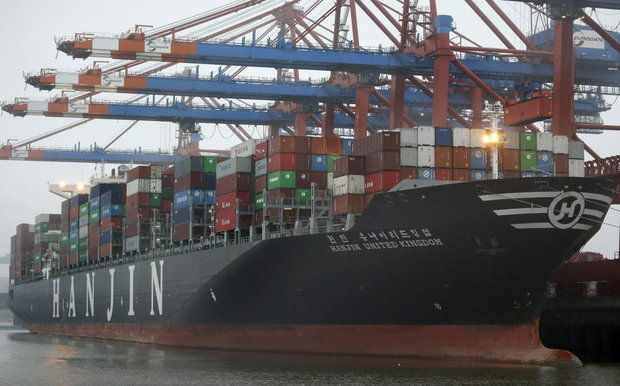forum
library
tutorial
contact

Portland Port Aims to Replace
Hanjin Amid Labor Dispute
by Conrad Wilson
Oregon Public Broadcasting, February 19, 2015
|
the film forum library tutorial contact |

|
Portland Port Aims to Replace
by Conrad Wilson
|
 A Hanjin shipping vessel was tied up at Terminal 6 at the Port of Portland.
A Hanjin shipping vessel was tied up at Terminal 6 at the Port of Portland.
But dockworkers moved so slowly, that Hanjin's next vessel was already steaming up the Columbia River, according to Bill Wyatt, executive director of the Port of Portland.
"That is really just unacceptable to a carrier," Wyatt said.
According to officials at the Port of Portland, on Feb. 9, International Longshore and Warehouse Union workers did not go to work despite the fact that a Hanjin vessel was at the port waiting to be offloaded.
On Feb. 10, Hanjin announced it would end operations at the Port of Portland March 9.
Now, Port of Portland officials are trying to convince other shipping companies to call at a port that's caught up in a two-year long labor dispute. And because of that labor history, the search for a carrier to replace Hanjin -- the port's largest international carrier -- could be a tricky one.
The labor dispute at the Port of Portland pre-dates the current talks between the ILWU and the Pacific Maritime Association. Their contract expired on June 30. Since then, work has slowed and even stopped at 29 West Coast ports.
Without a coastwide contract, there's no arbitration process in place to address the long-simmering conflict in Portland.
The local conflict involves the ILWU and ICTSI Oregon, the company that contracts with the port to hire workers to remove containers from ships.
Jennifer Sargent, a spokeswoman for the union, said ICTSI Oregon isn't following the membership agreement it signed when it joined the Pacific Maritime Association in 2010.
"Unfortunately ICTSI operates mostly in developing nations and hasn't properly addressed the needs of their customers and workforce here in the United States," she said. "ICTSI's approach to both has been, 'This is what ICTSI wants, take it or leave it.' "
ICTSI Oregon CEO Elvis Ganda said in a statement that retaining and attracting new carriers to Terminal 6 is his top priority and one he's willing to work with the union to achieve.
"We are hopeful . . . that the ILWU will cease its work stoppages and slowdowns and work with us in a cooperative venture to provide a thriving and productive container terminal for the good of the Columbia River region," he said.
For more than a year, Hanjin has publicly expressed frustration with the ongoing labor dispute between ICTSI Oregon and the ILWU at the Port of Portland.
According to ICTSI Oregon company officials, the Feb. 9 no-show was the latest in a series of incidents where union workers either walked off the job or did not show up for work.
On Feb. 9, the union put out a statement about its actions that said it was "responding to ICTSI's constant, relentless and wholesale firings of longshoremen in an atmosphere where there is no arbitration mechanism."
Wyatt, who runs the port, said Hanjin executives didn't say they were leaving because of the labor dispute.
"I don't think any of the carriers are interested antagonizing labor because they have to deal with the same union all up and down the West Coast," Wyatt said. "So they're not going to say it was because of labor. But they would say it was because of very poor productivity at the terminal."
Productivity is measured by the rate at which containers are loaded and unloaded from ships.
The region's business community decried the news of Hanjin's departure. Many business owners said they were frustrated with the labor dispute while others said they were concerned about how to deal with increased shipping costs.
Hanjin Shipping accounts for 78 percent of the container traffic at the port's Terminal 6, Oregon's only international container terminal.
Two other companies use the terminal: Westwood Shipping and German-based Hapag-Lloyd.
The port could try to get those carriers to expand service. Another option would be to attract a new carrier.
Ganda, the ICTSI Oregon CEO, said in his statement that it may not be easy to attract a new carrier.
"This will be a difficult task, given that the situation at Terminal 6 goes much deeper and has been going on much longer than the current labor dispute at other West Coast ports," Ganda wrote.
Leaders at the Port of Portland said they're well aware of the challenges they face.
Wyatt said it could take two years to get a new company to replace Hanjin.
"On the other side of this equation, there's actually a very good market here in Portland for ocean container service to Asia," he said. "It's not huge, but it's profitable. So that's really why Hanjin stayed as long as they did, because they were quite successful here."
(bluefish notes: Port Extends Ocean Carrier Subsidies)
Wyatt said he blames the ILWU's leadership in San Francisco for Hanjin's departure.
"A lot of these guys, they're going to lose a lot of work (in Portland) as a result of this and I think it's most unfortunate," he said.
Leal Sundet, a Local 8 member and ILWU Coast Committeeman, said through a spokeswoman that the union wants ICTSI to be successful in Portland.
"The Director of the Port of Portland is a big part of the problem," he wrote. "The reality is that it was ICTSI that drove Hanjin out of Portland, and the Director of the Port should deal with that dynamic instead of worrying about the ILWU or the workforce that it represents."
Related Pages:
Port Extends Ocean Carrier Subsidies by Mateusz Perkowski, Capital Press, 12/10/14
learn more on topics covered in the film
see the video
read the script
learn the songs
discussion forum
